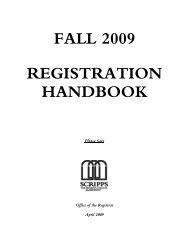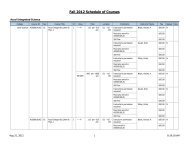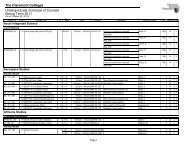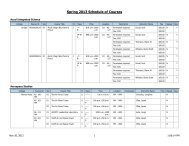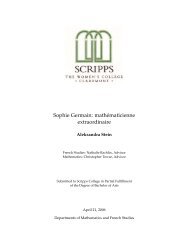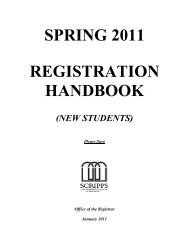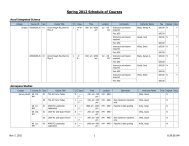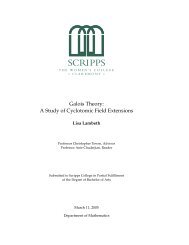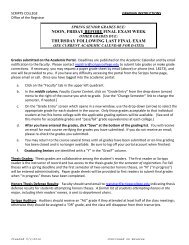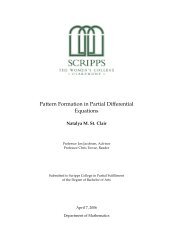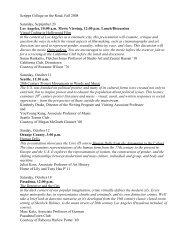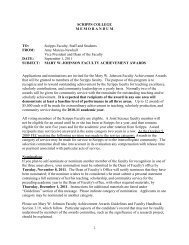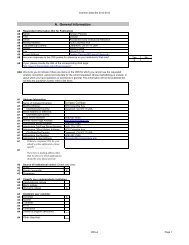Requirements for Bachelor of Arts Degree - Scripps College
Requirements for Bachelor of Arts Degree - Scripps College
Requirements for Bachelor of Arts Degree - Scripps College
Create successful ePaper yourself
Turn your PDF publications into a flip-book with our unique Google optimized e-Paper software.
<strong>Requirements</strong> <strong>for</strong> <strong>Bachelor</strong> <strong>of</strong> <strong>Arts</strong> <strong>Degree</strong><br />
Students are held to the requirements <strong>of</strong> the catalog in effect at the time they first<br />
enroll as a degree or certificate-seeking student.<br />
The <strong>Bachelor</strong> <strong>of</strong> <strong>Arts</strong> degree at <strong>Scripps</strong> is earned by satisfactory completion <strong>of</strong> a<br />
minimum <strong>of</strong> 32 courses to include the following:<br />
1. General education requirements as follow:<br />
• Three-semester Core Curriculum;<br />
• Writing 50 – Critical Analysis requirement;<br />
• Breadth <strong>of</strong> study requirement;<br />
• Race and ethnic studies requirement;<br />
• Feminist, gender, and sexuality studies requirement;<br />
• Foreign Language competency; and<br />
• Mathematics competency<br />
All general education requirements must be completed by the end <strong>of</strong> the first semester<br />
<strong>of</strong> the senior year.<br />
2. Completion <strong>of</strong> a major (nine or more courses - minimum <strong>of</strong> eight courses plus senior<br />
thesis - as defined in this catalog).<br />
3. Additional elective courses, to bring total to 32 minimum.<br />
Each requirement addresses important elements in the building <strong>of</strong> a student’s<br />
educational foundation. They are designed to introduce each student to a variety <strong>of</strong><br />
<strong>for</strong>mal ways <strong>of</strong> thinking, to provide a reasonable base <strong>of</strong> understanding <strong>of</strong>, and<br />
participation in, the world <strong>of</strong> the 21 st century, and to encourage a commitment to<br />
lifelong learning. Upon entering <strong>Scripps</strong> <strong>College</strong>, a student is assigned a faculty adviser<br />
who will aid in arranging a program <strong>of</strong> studies suitable to the student’s interests,<br />
previous training, and academic objectives. The student is expected to consult with an<br />
adviser throughout each year regarding academic plans.<br />
General Education <strong>Requirements</strong><br />
All general education requirements must be completed by the end <strong>of</strong> the first semester<br />
<strong>of</strong> the senior year.<br />
Core Curriculum in Interdisciplinary Humanities (three courses)<br />
• Core I to be taken fall semester <strong>of</strong> the first year;
• Core II to be taken spring semester <strong>of</strong> the first year<br />
• Core III to be taken fall semester <strong>of</strong> the second year.<br />
Writing (one course)<br />
• WRIT 050 - Critical Analysis, to be taken fall semester <strong>of</strong> the first year.<br />
Breadth <strong>of</strong> Study<br />
<strong>Scripps</strong> <strong>College</strong> believes that it is important <strong>for</strong> all students to understand that there are<br />
different ways <strong>of</strong> thinking about knowledge and <strong>of</strong> defining and examining problems.<br />
The goal <strong>of</strong> the breadth <strong>of</strong> study requirement is to introduce students to different ways<br />
<strong>of</strong> knowing and different ways <strong>of</strong> thinking. All students are required to complete one<br />
course in each <strong>of</strong> the areas below. A course may meet only one <strong>of</strong> the four Breadth <strong>of</strong><br />
Study requirements (i.e., Fine <strong>Arts</strong>, Letters, Natural Sciences, or Social Sciences).<br />
1. Fine <strong>Arts</strong> (one course from among the following):<br />
• Any art course;<br />
• Dance (full course only which includes dance history and theory);<br />
• MUS 003, MUS 081, or any other music theory or music history course;<br />
• THEA 001A, THEA 001C, THEA 001E, THEA 001F, THEA 002, THEA 023, THEA 024,<br />
THEA 115D, THEA 115J, THEA 115M, THEA 115N, THEA 115O, THEA 141; or<br />
• An equivalent course.<br />
2. Letters (one course from among the following):<br />
• Any art history course<br />
• Any literature course completed in English or a <strong>for</strong>eign language, but not writing;<br />
• Any philosophy course except logic;<br />
• Any classics course except Greek, Hebrew, and Latin language through the<br />
intermediate level;<br />
• Any religious studies course;<br />
• An equivalent course.<br />
3. Natural Sciences (one course from among the following):<br />
• Any Keck Science course numbered 50–89 <strong>for</strong> nonscience majors; or<br />
• Any introductory science course <strong>for</strong> majors in biology, chemistry, neuroscience,<br />
or physics; or<br />
• An equivalent course with a lab.<br />
4. Social Sciences (one course from among the following):
• Anthropology below 100;<br />
• ECON 051 or ECON 052;<br />
• History (any full course);<br />
• POLI 100, POLI 110, POLI 120, POLI 130 or POLI 140;<br />
• PSYC 052; or<br />
• An equivalent course.<br />
Race and Ethnic Studies (one course)<br />
• The race and ethnic studies requirement assesses the systematic discrimination<br />
and exploitation <strong>of</strong> African Americans, Latino Americans, Native Americans,<br />
Asian Americans, and Arab Americans that have figured so critically in the history<br />
<strong>of</strong> this country. This requirement is met by taking one course that focuses<br />
primarily on one or more <strong>of</strong> these five groups in the United States.<br />
• A list <strong>of</strong> courses approved to meet this requirement is maintained on the<br />
registrar’s web page and a link to the currently available courses appears near<br />
the bottom <strong>of</strong> the “Course Area” list (SC Race and Ethnic St Req) on the academic<br />
portal schedule <strong>of</strong> courses <strong>for</strong> each semester.<br />
Feminist, Gender, and Sexuality Studies (one course)<br />
• Students must complete one course in feminist, gender and sexuality studies.<br />
The requirement may be met by passing any course in the <strong>Scripps</strong> Feminist,<br />
Gender, and Sexuality Studies program or any other course approved by<br />
Intercollegiate Women’s Studies. Courses that fulfill this requirement will be<br />
identified in the biannual registration materials.<br />
Language Requirement Statement<br />
Students are strongly encouraged to fulfill their language requirement in an<br />
uninterrupted sequence. In all cases, however, the language requirement must be<br />
completed by the end <strong>of</strong> the first semester <strong>of</strong> the senior year.<br />
Foreign Language (three courses should be completed in an uninterrupted sequence)<br />
• Three semesters <strong>of</strong> one language (through intermediate level);<br />
• Equivalent courses or competency<br />
Mathematics (one course)<br />
• MATH023 SC;<br />
• BIOL 175BIOL175 KS , ECON120 SC, or PSYC103 SC;<br />
• Logic (in philosophy); or<br />
• An equivalent course.
Discussion <strong>of</strong> <strong>Requirements</strong><br />
Core Curriculum in Interdisciplinary Humanities<br />
The Core Curriculum <strong>of</strong>fered at <strong>Scripps</strong> gives students the opportunity to investigate<br />
important issues <strong>of</strong> human existence in an interdisciplinary context. Each first-year<br />
student is required to complete the three-course Core beginning in the first fall<br />
semester. The courses are described under Core Curriculum in Interdisciplinary<br />
Humanities: Histories <strong>of</strong> the Present.”<br />
Students who transfer to <strong>Scripps</strong> will be placed into the Core Curriculum sequence<br />
based upon their class standing at entrance.<br />
• Students who transfer with the equivalent <strong>of</strong> four or fewer <strong>Scripps</strong> courses will<br />
be required to begin with Core I and complete the three-course sequence.<br />
• Students who transfer with the equivalent <strong>of</strong> five to eight courses will complete<br />
Core II and Core III.<br />
• Students who transfer as first-semester sophomores (eight to twelve courses)<br />
must complete Core III.<br />
• Transfer students entering <strong>Scripps</strong> with the equivalent <strong>of</strong> 12 or more <strong>Scripps</strong><br />
courses will be waived from the Core Curriculum requirement.<br />
Foreign Language<br />
One <strong>of</strong> the most important features <strong>of</strong> a liberal education is familiarity with the<br />
language <strong>of</strong> a culture other than one’s own. Such familiarity not only clarifies a student’s<br />
sense <strong>of</strong> cultural identity, but also enhances articulateness and enlarges the view <strong>of</strong> the<br />
scope <strong>of</strong> thought and language. Languages currently available <strong>for</strong> study in Claremont<br />
include Modern Standard Arabic, Chinese, French, German, Italian, Japanese, Korean,<br />
Russian, and Spanish. Classical Greek, Hebrew, and Latin are also available.<br />
The <strong>Scripps</strong> language requirement is met by demonstrating competency and pr<strong>of</strong>iciency<br />
in one <strong>for</strong>eign language, ancient or modern, by:<br />
a. The achievement <strong>of</strong> a thorough knowledge <strong>of</strong> basic grammatical structure;<br />
b. The ability to write a composition correctly; and<br />
c. In the case <strong>of</strong> a modern language, the ability to understand a native speaker at a<br />
moderate speed and to respond intelligently. The required level <strong>of</strong> language<br />
competency must be demonstrated in one <strong>of</strong> the following ways:<br />
• By passing the third-semester level course in one language through The<br />
Claremont <strong>College</strong>s Modern Languages Program, the cooperative Classics
Department, or full-course American Sign Language credit. Students are strongly<br />
encouraged to fulfill the language requirement in an uninterrupted sequence. In<br />
all cases, however, the language requirement must be completed by the end <strong>of</strong><br />
the first semester <strong>of</strong> the senior year.<br />
• By passing a departmental competency examination. Language placement tests<br />
in French, German, Italian, Latin, and Spanish are held at <strong>Scripps</strong> during fall<br />
Orientation, or by arrangement, to demonstrate competency <strong>for</strong> full or partial<br />
waiver <strong>of</strong> the courses required using one <strong>of</strong> those languages. Placement exams<br />
in Modern Standard Arabic, Chinese, Japanese, Korean, and Russian are<br />
administered by other Claremont <strong>College</strong>s during Orientation.<br />
• By scoring at or above the (recentered) scores indicated below on a SAT Subject<br />
Tests Foreign Language Achievement Test:<br />
Chinese 630<br />
Italian 630<br />
French 640<br />
Japanese 620<br />
German 630<br />
Latin 630<br />
Modern Hebrew 540<br />
Spanish 630<br />
The <strong>for</strong>eign language requirement will be waived <strong>for</strong> international students who<br />
graduated from a non-English high school program. Other students may petition <strong>for</strong> a<br />
waiver <strong>of</strong> the requirement based upon written verification <strong>of</strong> non-English language<br />
pr<strong>of</strong>iciency by an interview with a Claremont faculty member who is fluent in the<br />
language. Students may also petition to waive the language requirement by successful<br />
completion <strong>of</strong> an <strong>of</strong>f-campus examination at another college, verified by a letter bearing<br />
that college’s seal, and <strong>for</strong>warded in a sealed envelope to the registrar. (Any<br />
examination fees will be paid directly to the other college by the student.)<br />
Because <strong>of</strong> the importance <strong>of</strong> language to the study <strong>of</strong> the humanities, to work in most<br />
majors, and to many future careers, students who have met the basic language<br />
requirement in any one <strong>of</strong> these ways are strongly urged to continue their study <strong>of</strong><br />
<strong>for</strong>eign language and literature beyond the required competency level. <strong>Scripps</strong> students<br />
may not receive credit <strong>for</strong> courses taken in the intercollegiate Self-Instructional<br />
Language Program (SILP) because SILP has not yet been evaluated by <strong>Scripps</strong> faculty.<br />
This policy will be evaluated at a later date.<br />
Mathematics<br />
The extensive use <strong>of</strong> mathematics in our lives as individuals and as a society indicates<br />
that a knowledge <strong>of</strong> mathematics is essential <strong>for</strong> practical living and <strong>for</strong> pr<strong>of</strong>essional<br />
development. The math requirement may be met in either theoretical or applied
mathematics. Theoretical mathematics involves methods <strong>of</strong> inquiry based on rigorous<br />
deduction and <strong>for</strong>mal pro<strong>of</strong> that are different from those in other areas. Applied<br />
mathematics is a fundamental tool in the social and natural sciences and in many other<br />
areas. The math requirement may be satisfied in any one <strong>of</strong> the following ways:<br />
1. By passing MATH 023, Precalculus, or a higher-level math course.<br />
2. By placing into MATH 030 or a higher-level math course on the placement exam.<br />
(The Math Placement Exam is administered during fall Orientation.)<br />
3. By passing a course in the applications <strong>of</strong> mathematics, i.e., (Statistics); BIOL 175<br />
- Applied Biostatistics; ECON 120 - Statistics; or PSYC 103 - Psychological Statistics.<br />
4. By passing a course in <strong>for</strong>mal logic (through the Philosophy Department).<br />
Because <strong>of</strong> the importance <strong>of</strong> mathematics to the study <strong>of</strong> the social and natural<br />
sciences and to work in many careers, students are strongly encouraged to continue<br />
their study <strong>of</strong> mathematics beyond the required level.<br />
Writing: Critical Analysis<br />
<strong>Scripps</strong> <strong>College</strong> believes that its students should be able to read well and to express<br />
themselves with precision, logic, and subtlety. WRIT 050 must be passed with a grade <strong>of</strong><br />
C or higher during the first semester <strong>of</strong> <strong>Scripps</strong> enrollment. Students earning less than C<br />
will be required to enroll in WRIT 050 the subsequent semester and until passed with a<br />
C or higher; all grades will be computed in the grade point averages.<br />
• Transfer students who have completed a clearly identifiable and equivalent<br />
college writing course with a grade <strong>of</strong> C or higher will have met this requirement.<br />
• Transfer first-year and sophomore students who have not completed an<br />
equivalent course will be required to enroll in WRIT 050 during their first<br />
semester.<br />
• Students who transfer to <strong>Scripps</strong> as juniors are waived from this requirement.<br />
<strong>Requirements</strong> <strong>for</strong> the Major<br />
Majors are <strong>of</strong>fered in fields in which the senior thesis can be supervised by a member<br />
<strong>of</strong> the <strong>Scripps</strong> faculty, and, if the major is <strong>of</strong>fered at <strong>Scripps</strong>, the <strong>Scripps</strong> major<br />
requirements must be met.<br />
Be<strong>for</strong>e preregistration in spring <strong>of</strong> the sophomore year, each student must declare a<br />
major by filing an approved junior major <strong>for</strong>m in the registrar’s <strong>of</strong>fice. At the same time,<br />
the student will select a faculty adviser within the major field who will assist in planning<br />
the future program. Students who plan to complete two majors must also declare the<br />
second major by filing a second approved junior major <strong>for</strong>m assisted by a faculty<br />
member in the second field. Students planning to complete a minor are encouraged to<br />
<strong>for</strong>mally declare the minor at the end <strong>of</strong> the sophomore year.
A major is an integrated program <strong>of</strong> study composed <strong>of</strong> courses and independent work<br />
within a discipline or interdisciplinary program. It should have an inner rationale and<br />
coherence <strong>of</strong> structure. The basic educational policy <strong>of</strong> <strong>Scripps</strong> is to enable students to<br />
think independently and critically. In planning a major, a student should implement this<br />
policy by seeking to fulfill the following goals:<br />
1. Mastery <strong>of</strong> (a) skills and methods, (b) principles and theory, and (c) essential<br />
materials in the field. This mastery will usually be accomplished by successfully<br />
completing certain courses or a combination <strong>of</strong> courses and supervised<br />
independent study as determined by the department faculty. Passing the<br />
required courses <strong>for</strong> the major, a minimum <strong>of</strong> eight semester courses or their<br />
equivalent, with at least a 6.0 (C) grade point average is the basis <strong>for</strong> this<br />
standard.<br />
2. Demonstration <strong>of</strong> competence in the field. In the areas <strong>of</strong> music, dance, and<br />
theater, a senior per<strong>for</strong>mance and/or a thesis is required as a demonstration <strong>of</strong><br />
competence. In studio arts, a senior project is required. In all other fields,<br />
competence must be demonstrated by writing a senior thesis. Senior theses<br />
constitute an individual and independent work supervised by two faculty<br />
members (one <strong>of</strong> whom must be a member <strong>of</strong> the <strong>Scripps</strong> <strong>College</strong> faculty): the<br />
director <strong>of</strong> the thesis and a second reader chosen in the relevant field. Options<br />
consistent with the basic educational policy <strong>of</strong> the <strong>College</strong> may be considered<br />
equivalent to the thesis upon approval by two faculty members and petition to<br />
the Committee on Academic Review. Due dates <strong>for</strong> senior theses are determined<br />
by the faculty <strong>of</strong> each discipline. A minimum grade <strong>of</strong> D is required <strong>for</strong> the senior<br />
thesis/project <strong>for</strong> graduation.<br />
During September <strong>of</strong> the senior year, in consultation with a major adviser, the student<br />
files an approved senior major <strong>for</strong>m in the registrar’s <strong>of</strong>fice <strong>for</strong> each major the student<br />
anticipates completing, indicating those courses which the student plans to use to<br />
complete the major requirements. Seniors will be held to the specific courses indicated<br />
on the senior major <strong>for</strong>m. Written requests on a course substitution <strong>for</strong>m (available in<br />
the registrar's <strong>of</strong>fice) to change these intended courses must be approved by the major<br />
adviser and <strong>for</strong>warded to the registrar.<br />
Choices <strong>for</strong> Majors<br />
<strong>Scripps</strong> major requirements must be met if the major is <strong>of</strong>fered at <strong>Scripps</strong>.<br />
<strong>Requirements</strong> <strong>for</strong> majors at <strong>Scripps</strong> <strong>College</strong> are defined by departments and are listed in<br />
the catalog under the descriptions <strong>of</strong> the departmental programs. All majors consist <strong>of</strong> a<br />
minimum <strong>of</strong> eight semester courses or their equivalent, and a senior thesis (or senior<br />
seminar or project). At least half <strong>of</strong> these courses must be taken at <strong>Scripps</strong>, except<br />
where this regulation is specifically waived. Courses that fulfill major requirements will
e chosen by the student in consultation with the adviser and listed on the approved<br />
senior major <strong>for</strong>m.<br />
Dual Major<br />
• A dual major must fulfill all <strong>of</strong> the major requirements <strong>for</strong> each <strong>of</strong> the two<br />
disciplines (unless an exception is specified in the catalog) and complete a senior<br />
thesis that integrates the skills and knowledge <strong>of</strong> both fields. The two thesis<br />
readers are from the faculty <strong>of</strong> the two fields represented by the dual major.<br />
Normally, students who undertake a dual major would be required to complete<br />
only one senior seminar, but two may be taken <strong>for</strong> credit if the thesis readers<br />
recommend it. In the case <strong>of</strong> a dual major where each department requires<br />
participation in a senior seminar, and in the event these seminars meet at the<br />
same time, the student, with the assistance <strong>of</strong> advisers from each department,<br />
will determine the senior seminar in which the student will enroll. Courses that<br />
fulfill each major requirement will be listed on each <strong>of</strong> the two senior major<br />
<strong>for</strong>ms as approved by the adviser in each field. Courses that fulfill each major<br />
requirement will be listed on each <strong>of</strong> the two senior major <strong>for</strong>ms as approved by<br />
the adviser in each field.<br />
Double Major<br />
• A double major must fulfill all <strong>of</strong> the major requirements <strong>for</strong> each <strong>of</strong> two<br />
disciplines and complete two theses, one in each <strong>of</strong> the two subject areas.<br />
Courses that fulfill each major requirement will be listed on each <strong>of</strong> two senior<br />
major <strong>for</strong>ms as approved by the student’s adviser in each field.<br />
Self-designed Major<br />
• A self-designed major may be created by a student from among many fields<br />
<strong>of</strong>fered at the colleges, provided that this major consists <strong>of</strong> a minimum <strong>of</strong> eight<br />
semester courses or their equivalent to demonstrate mastery <strong>of</strong> skills and<br />
methods, principles and theory, and essential materials in the field and to be<br />
culminated with a thesis which will allow the student to demonstrate<br />
competency in the proposed major. The student will work closely with a <strong>Scripps</strong><br />
academic adviser in at least one <strong>of</strong> the fields chosen <strong>for</strong> this special major in<br />
order to plan the course <strong>of</strong> study. The proposal <strong>for</strong> this self-designed course <strong>of</strong><br />
study must include a description <strong>of</strong> the major and its learning objectives. It is to<br />
be approved by a faculty member in each relevant field indicated by the list <strong>of</strong><br />
courses on an accompanying Junior Major Form. The proposal must be approved<br />
by the Committee on Academic Review. The thesis will be read by two faculty<br />
members in the appropriate fields including at least one from <strong>Scripps</strong>.
Up to two courses (including prerequisite courses) may double count towards each <strong>of</strong><br />
two majors (but not also a General Requirement). Students may exceed this double<br />
counting limit if the total number <strong>of</strong> unduplicated courses on the approved Senior Major<br />
Form <strong>for</strong> each major (excluding senior seminar and thesis) is at least six courses. (See<br />
Double Counting Courses in this catalog.)<br />
Majors are <strong>of</strong>fered in fields in which the senior thesis can be supervised by a member <strong>of</strong><br />
the <strong>Scripps</strong> faculty. If the major is <strong>of</strong>fered at <strong>Scripps</strong> or is an intercollegiate major in<br />
which <strong>Scripps</strong> participates, the <strong>Scripps</strong> major requirements must be met and a <strong>Scripps</strong><br />
faculty member must serve as the major adviser. If a student wishes to major in a field<br />
<strong>for</strong> which no provision is made at <strong>Scripps</strong> (<strong>for</strong> example, sociology), the student may<br />
complete the major in part or entirely at one or more <strong>of</strong> the other Claremont <strong>College</strong>s,<br />
and a faculty member <strong>of</strong> the <strong>of</strong>f-campus college department must be the major adviser.<br />
In this case the student must meet the specific requirements <strong>of</strong> the other colleges <strong>for</strong><br />
the major, to include at least eight courses, and also write a senior thesis. A <strong>Scripps</strong><br />
faculty member must serve as a thesis reader. Off-campus majors require the oncampus<br />
adviser’s signature <strong>of</strong> approval plus the signature <strong>of</strong> the <strong>of</strong>f-campus adviser in<br />
the major field on the senior major <strong>for</strong>m. All majors are subject to review by the dean <strong>of</strong><br />
the faculty and the Committee on Academic Review.<br />
Honors in the Major<br />
If an honors program in the major is <strong>of</strong>fered at <strong>Scripps</strong>, the <strong>Scripps</strong> honors<br />
requirements must be met. When the <strong>Scripps</strong> major does not <strong>of</strong>fer honors, a student<br />
may discuss with the department/program chair the possibility <strong>of</strong> creating an honors<br />
program.<br />
Off-Campus Majors<br />
<strong>Scripps</strong> students may petition <strong>for</strong> honors in <strong>of</strong>f-campus majors if that major <strong>of</strong>fers<br />
honors and the student meets both the <strong>of</strong>f-campus honors requirements and the<br />
<strong>Scripps</strong> minimum requirements <strong>for</strong> honors as follow:<br />
• GPA requirement <strong>of</strong> 10.5 within the major (consisting <strong>of</strong> at least 8 major courses<br />
plus thesis, excluding prerequisites); and<br />
• An honors quality senior thesis with a grade <strong>of</strong> A or A– with a successful oral<br />
defense to include at least one <strong>Scripps</strong> reader.<br />
When the <strong>of</strong>f-campus major has honors at one college and not at another, the student<br />
should follow the program <strong>of</strong> the college that <strong>of</strong>fers honors, but in unusual<br />
circumstances may petition the Committee on Academic Review <strong>for</strong> an exception. In<br />
both instances, the petition must include the minimum criteria required by the readers<br />
(<strong>for</strong> example, additional or specific courses or minimum thesis length) and must be
acceptable both to the <strong>of</strong>f-campus major adviser and reader(s) as well as the <strong>Scripps</strong><br />
adviser and reader(s).<br />
Intercollegiate Programs<br />
For intercollegiate programs where no honors major program has been defined in the<br />
<strong>Scripps</strong> or another catalog, <strong>Scripps</strong> students may petition <strong>for</strong> honors in the major. The<br />
minimum honors requirements will be as follow:<br />
• GPA requirement <strong>of</strong> 10.5 within the major (consisting <strong>of</strong> at least 8 major courses<br />
plus thesis, excluding prerequisites); and<br />
• An honors quality thesis with a grade <strong>of</strong> A or A and a successful oral defense to<br />
include at least one <strong>Scripps</strong> reader.<br />
Self-Designed Major<br />
In a self-designed major, it would be the decision <strong>of</strong> all faculty members involved in that<br />
self-designed major to agree to an honors program and to determine the criteria <strong>for</strong><br />
honors provided the student meets the <strong>Scripps</strong> minimum requirements <strong>for</strong> honors as<br />
follow:<br />
• GPA requirement <strong>of</strong> 10.5 within the major (consisting <strong>of</strong> at least 8 major courses<br />
plus thesis, excluding prerequisites); and<br />
• An honors quality thesis with a grade <strong>of</strong> A or A– and a successful oral defense to<br />
include at least one <strong>Scripps</strong> reader.<br />
Minors<br />
<strong>Scripps</strong> minor requirements must be met if the minor is <strong>of</strong>fered at <strong>Scripps</strong>.<br />
• Students planning to complete a minor are encouraged to declare the minor<br />
<strong>for</strong>mally at the end <strong>of</strong> the sophomore year. A completed <strong>for</strong>m <strong>for</strong> declaring a<br />
minor, including the approval <strong>of</strong> the student’s <strong>Scripps</strong> adviser and a pr<strong>of</strong>essor in<br />
the designated minor area <strong>of</strong> study, must be submitted to the registrar no later<br />
than the deadline to add classes in the last semester <strong>of</strong> enrollment. Satisfactory<br />
completion <strong>of</strong> a minor will be measured by passing grades in all required courses<br />
with a minimum grade point average <strong>of</strong> 6.0 (C) or higher.<br />
• <strong>Requirements</strong> <strong>for</strong> minors at <strong>Scripps</strong> <strong>College</strong> are defined by departments and are<br />
listed in the catalog under the descriptions <strong>of</strong> the departmental programs. All<br />
minors consist <strong>of</strong> a minimum <strong>of</strong> six semester courses or their equivalent. Up to<br />
one course may double count between a major and a minor or between two<br />
minors (but not also a major or General Requirement). Students may exceed this<br />
double counting limit if the total number <strong>of</strong> unduplicated courses on the<br />
approved declaration <strong>for</strong>m <strong>for</strong> each minor is at least five courses. At least half <strong>of</strong>
the minor courses must be taken at <strong>Scripps</strong>, except where this regulation is<br />
specifically waived.<br />
• A few <strong>of</strong>f-campus minors in disciplines not <strong>of</strong>fered at <strong>Scripps</strong> are available at<br />
Pitzer or Pomona <strong>College</strong>s. The requirements <strong>for</strong> the <strong>of</strong>f-campus minor must be<br />
met, but in all instances must consist <strong>of</strong> at least six semester courses or their<br />
equivalent. The above double counting limits apply. The minor <strong>for</strong>m must be<br />
approved by the <strong>of</strong>f-campus faculty minor adviser as well as the <strong>Scripps</strong> adviser<br />
and major adviser.<br />
• Students may petition to the Committee on Academic Review <strong>for</strong> a self-designed<br />
minor, provided that the minor consists <strong>of</strong> at least six semester courses or their<br />
equivalent. The student will work closely with a <strong>Scripps</strong> academic adviser in at<br />
least one <strong>of</strong> the fields chosen <strong>for</strong> this special minor in order to plan the course <strong>of</strong><br />
study. This self-designed minor is to be approved by a faculty member in each<br />
relevant field, <strong>Scripps</strong> adviser and major adviser(s), as well as by the Committee<br />
on Academic Review.<br />
Double Counting Courses<br />
1. The Core may not double count to meet any other General Requirement.<br />
2. No course may fulfill more than two requirements. Examples: Social Science plus<br />
Race and Ethnic Studies; Social Science plus major. A course may meet only one<br />
<strong>of</strong> the four Breadth <strong>of</strong> Study requirements (i.e., Fine <strong>Arts</strong>, Letters, Natural<br />
Sciences, or Social Sciences).<br />
3. A course used to demonstrate minimum language or mathematics competency<br />
may be double counted toward major(s) and/or minor(s) under the conditions<br />
outlined below.<br />
4. Up to two courses (including prerequisite courses) may double count towards<br />
each <strong>of</strong> two majors (but not also a General Requirement). Students may exceed<br />
this double counting limit if the total number <strong>of</strong> unduplicated courses on the<br />
approved Senior Major Form <strong>for</strong> each major (excluding senior seminar and thesis)<br />
is at least six courses.<br />
5. Up to one course (including prerequisites) may double count toward each <strong>of</strong> two<br />
minors (but not also a General Requirement). Students may exceed this double<br />
counting limit if the total number <strong>of</strong> unduplicated courses on the approved<br />
declaration <strong>for</strong>m <strong>for</strong> each minor is at least five courses.<br />
6. Up to one course (including prerequisite courses) may double count between a<br />
major and a minor (but not also a General Requirement). Students may exceed<br />
the above double counting limits if the total number <strong>of</strong> unduplicated courses on<br />
the approved Senior Major Form is at least six courses and the total number <strong>of</strong><br />
unduplicated courses on the approved minor declaration <strong>for</strong>m is at least five<br />
courses.
Residence Requirement <strong>for</strong> Graduation<br />
A minimum <strong>of</strong> 16 courses, evidenced by a minimum <strong>of</strong> two years in regular, full-time<br />
attendance, must be completed in residence at <strong>Scripps</strong>, including the final eight courses.<br />
Affiliated <strong>of</strong>f-campus study programs meet residence requirements. Normally, students<br />
may enroll in an affiliated <strong>of</strong>f-campus study program <strong>for</strong> a maximum <strong>of</strong> two semesters;<br />
transfer students usually are allowed only one semester in an affiliated <strong>of</strong>f-campus<br />
study program. A petition <strong>for</strong> an exception to residence requirements will be considered<br />
by the Committee on Academic Review.<br />
<strong>Degree</strong> Completion and Commencement Participation<br />
Students may participate in commencement exercises upon satisfactory completion <strong>of</strong><br />
all degree requirements as verified by the registrar. Satisfactory completion is<br />
demonstrated by a minimum grade point average <strong>of</strong> 6.0 (C) in the major(s), minor(s),<br />
and cumulatively and at least a C in WRIT 050. The cumulative grade point average is<br />
calculated only on courses taken at The Claremont <strong>College</strong>s or on an affiliated <strong>of</strong>fcampus<br />
study program (study abroad) as a <strong>Scripps</strong> student. The grade point average in<br />
the major(s) and minor(s) excludes grades received in courses prerequisite to the<br />
major(s) or minor(s). Students are normally expected to complete degree requirements<br />
published in the catalog and/or addendum <strong>of</strong> their first semester <strong>of</strong> enrollment.<br />
<strong>Degree</strong>s are granted effective October 18 <strong>for</strong> students completing requirements over<br />
the summer, effective January 20 <strong>for</strong> students completing requirements during the fall<br />
semester, or effective in May at the end <strong>of</strong> the spring semester. Students completing<br />
requirements the preceding October and January will be invited to participate in the<br />
subsequent May commencement activities.



